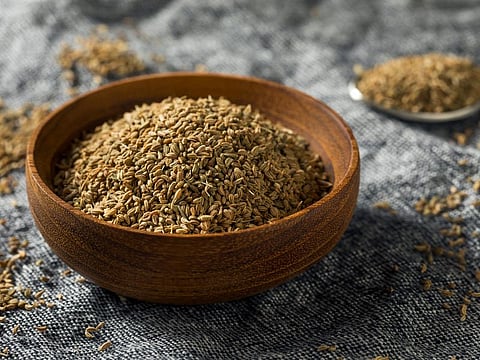Ajwain water (carom seeds): The centuries-old bloating cure and women’s wellness ally—does science agree?
Ajwain water: A traditional remedy for women's digestive health

Why did our mothers always reach for the spice cabinets whenever we complained about feeling bloated? The answer, for most of us, at least, the cabinet would contain Ajwain or carom seeds, which, they insisted was the answer to our physical discomfort and annoyance. You would feel fine again, your mother would insist.
Turns out, they were onto something.
What is Ajwain water?
Ajwain water is a simple, age-old remedy made by steeping carom seeds in warm water. It’s long been a staple in traditional medicine, and now, it’s gaining recognition in modern science too. “Ajwain is especially helpful for people dealing with digestive issues, water retention, or sluggish metabolism problems that are all too common in today’s stress-heavy, sedentary lifestyles,” says Ayesha Rehman, a clinical dietician, bariatric and sports Nutritionist based in India.
Its power lies in thymol, a bioactive compound with strong antispasmodic, antifungal, and carminative properties. “Thymol stimulates digestive enzymes like amylase and lipase, helps reduce intestinal fermentation, and regulates gut motility,” Rehman explains.
For those with hormonal imbalances, the mild diuretic and thermogenic effects may help support metabolism and reduce water retention

Women’s health ally: From PCOS to postpartum
Ajwain water appears particularly beneficial for women. “For those with PCOS or hormonal imbalances, its mild diuretic and thermogenic effects may help support metabolism and reduce water retention,” says Rehman. Anecdotally, many women report reduced menstrual cramps and bloating with regular use.In postpartum care, ajwain water has long been used to ease gas, bloating, and colic in new mothers. “Its uterotonic properties help support uterine recovery, while its gentle diuretic effect manages post-delivery swelling,” she adds.
While direct human trials on ajwain and PCOS are limited, its key compound, thymol, exhibits mild anti-inflammatory and metabolic effects in animal studies, both valuable for managing hormonal imbalances . Traditional practitioners often recommend ajwain water to ease water retention and support thermogenic metabolism, which may offer gentle relief during menstrual cycles and help reduce bloating.
Menstrual cramp relief
There haven’t been clinical trials specifically on ajwain for menstrual pain. However, its antispasmodic properties, confirmed in gut muscle studies, suggest ajwain could theoretically help reduce uterine cramping .
Anecdotal reports and centuries-old use support these benefits, although modern clinical research is still lacking. Given its traditional success in fostering postpartum recovery, especially for reducing bloating and supporting uterine health, many new mothers continue to find comfort in a daily cup.
Can it really cure digestion and fight inflammation?
Furthermore, studies in rabbits and rats have shown that ajwain extract can reduce total cholesterol, LDL ('bad') cholesterol, and triglycerides, while boosting HDL ('good') cholesterol. Thymol, the spice’s key compound, appears to act as a natural calcium-channel blocker, helping to lower blood pressure in these animal models. Additional research on rats indicates that ajwain can speed up digestion, relieve gas and bloating, help treat peptic ulcers, and inhibit harmful bacteria such as E. coli and Salmonella in lab tests. It has also demonstrated anti-inflammatory effects in animal models of arthritis.
While these findings support ajwain’s traditional use, they come from animal and in-vitro research. More clinical trials in humans are essential to confirm how well ajwain can support digestion, heart health, metabolism, and inflammation in real life—especially at doses achievable through typical dietary use.
How to make it
It’s as easy as steeping tea:
Add 1 tsp of ajwain seeds to 1.5–2 cups of water
Boil for 5–10 minutes
Strain and sip warm — ideally on an empty stomach in the morning or after meals
You can add a squeeze of lemon or a pinch of pink salt if you like a bit of flair.
A few notes before you start
Ajwain water is generally safe in moderate amounts, but pregnant or breastfeeding women should consult a doctor first — in large quantities, ajwain may act as a uterine stimulant. And if you have any chronic conditions, especially gastrointestinal ones, it’s best to check with your healthcare provider before adding anything new to your routine.
So, while ajwain water isn’t a magic cure-all, the time-tested benefits and emerging scientific support make it a soothing, natural option to consider especially for digestion, mild bloating, and women’s wellness. So, if you’re looking to ease everyday discomfort or add a calming ritual to your day, a simple cup of ajwain water might just become your new go-to. Just remember to enjoy it carefully, and if you have any health concerns, don’t hesitate to check in with your healthcare provider.
Sometimes, the oldest remedies really do hold the freshest promise.
Sign up for the Daily Briefing
Get the latest news and updates straight to your inbox



